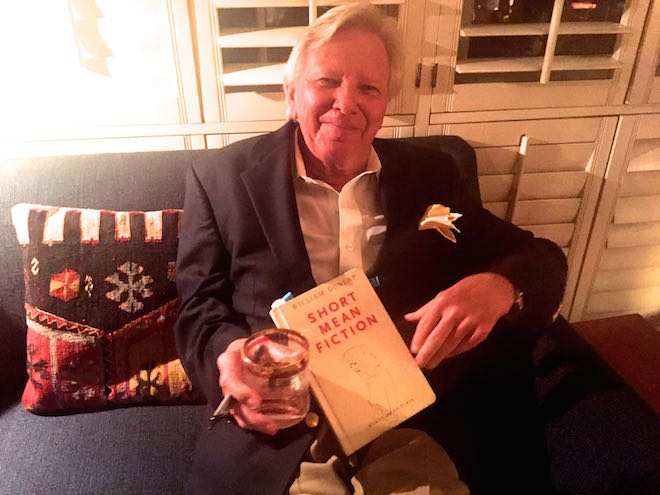'Short Mean Fiction'

“I wanted to be an artist before I knew what it was,” author, artist Bill Dunlap told Hollywood on the Potomac at a book party in his honor at the home of journalist, author Myra MacPherson. “My family, to their ever-lasting credit, didn’t discourage me, just got me the materials. I’m a victim or a product of the public schools of Mississippi so was not threatened by art courses. I just drew and painted and looked. I don’t know if there’s a visual equivalent to perfect pitch or not, but if there is I know my sight always overrode everything else.”
“I’m driving down the road, little eyes come right over the backseat of the car. I’d just look out into the woods and imagine myself floating out into it,” he said recalling his early childhood. “I saw everything. I looked. I was thought to be afflicted because I didn’t speak till I was 3 or 4 years old. Hell, I didn’t have anything to say! Once I learned to, I haven’t shut up.”
We can vouch for that. Dunlap had plenty to say, beginning with his new book: Short Mean Fiction. “What’s going on here is this book is having a life of its own. I say all that needs to be said in the introduction, about where these stories came from. What the introduction says is: ‘Artists keep sketchbooks. Mine, more than four decades worth, are filled with visual short-hand. There are drawings and ideas for things, sculptures and installations, along with phone numbers, grocery lists and things to do. And, of course, mindless doodles. I find critiques of my work sometimes harsh. Alongside welcome fragments of dialogue, next to drafts and outlines for fiction, these hybrid sketchbooks/journals have recently, as if of their own volition, come down from a high shelf in my studio to a table within easy reach. From time to time, out of curiosity, I open one. The working drawings are viable, the rants at times amusing, but it’s the vein of narrative that rushes up from the page like a charged found object that interests me most. When asked, I call what I do ‘hypothetical realism’. The places and things I paint are not real, but they could be. The same holds true for Short Mean Fiction. None of what I’ve written really happened, but it could have. Like tales from the Old Testament, these stories are mean, rampant with sex, violence, and death. They are all figments of an active, if not fertile imagination, and brevity may be their greatest joy. They are fictions through and through, and so the disclaimer be needed, consider it made. The drawings scattered throughout the volume are not illustrations but live in the same place, the sketchbooks, where I first wrote the stories, forgot them, and then found them again. To my mind, that’s what can be twisted. As with painting, I feel a little proud of authorship and make no literary claims for Short Mean Fiction.’ For what it’s worth, for better or for worse and to my utter of surprise, there are many, many more where these goddamned things came from.”





